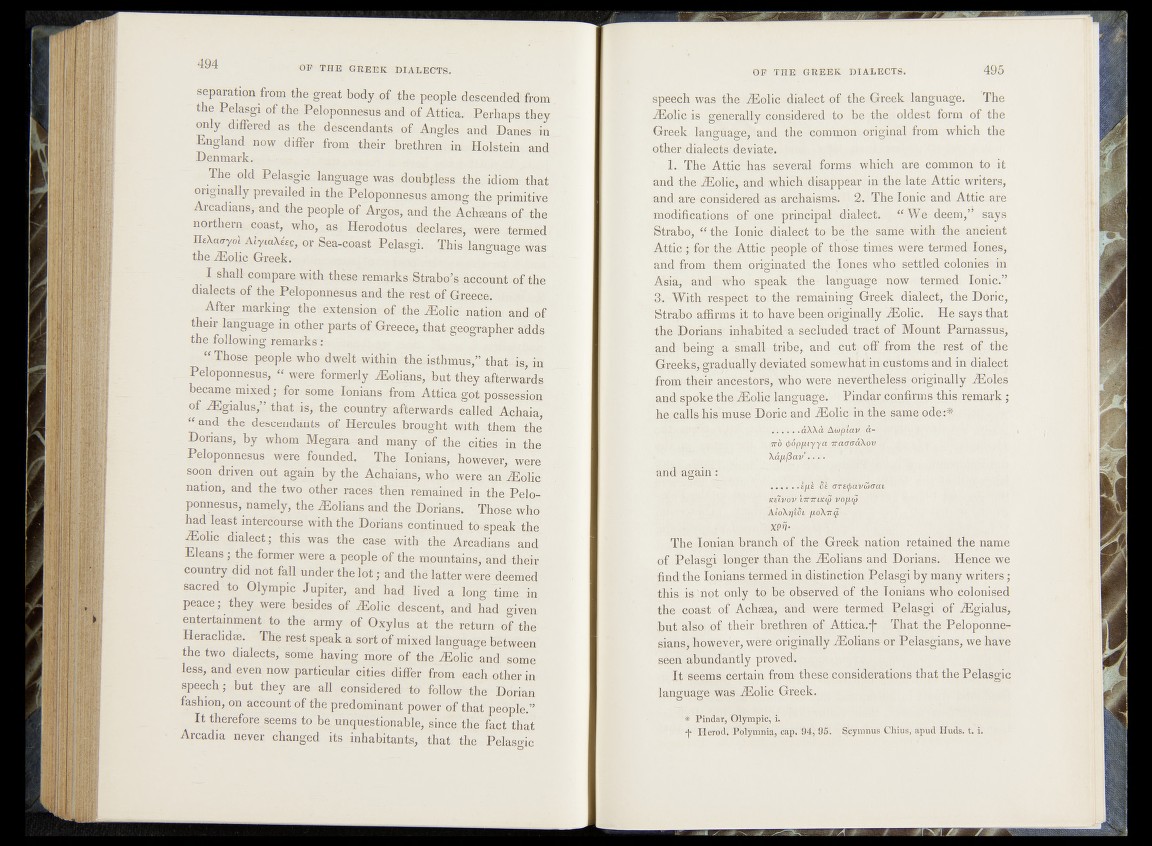
separation from the great body of the people descended* from
the Pelasgi of the Peloponnesus and of Attica.. Perhaps they
only differed as the descendants of Angles and Danes in
England now differ from their brethren in. Holstein and
Denmark.
The pld Pelasgic. language was feubfles^fhe. idiom that
originally prevailed in th e Peloponnesus among the primitive
Arcadians, and the people of Argos, and the Achseans of the
northern, coast, who,, as Herodotus ;.declares^ were termed
~ mxuayol AlymX^ or.Sea-coast Pelasgi. This language-was
th e .^ o lic Greek. ,
I shalbcompare with these rem arks* gtrabo^s ^account of the
dialects of the Peloponnesus and the rest,of Greene.
After jn a rk in g the extension of the iEolic nation and of
4heir la n g u ^ e in other parts of Greece, thaj^geographer adds
the following remarks:
Those people who dwelt within the,isthmus,’UhaUis-, pi
Peloponnesus, “ were formerly iEifiians, but they afterwards
became mixed; for some Ionians from Atticaig,o^ppssession
of iEgialus,” that is, the country afterward^.c.ailed Achaia,
“ and the descendants of Hercules brought w ith ^ lem -th e
Dorians, by whom Megara and many of t r e a t i e s in the
Peloponnesus r were founded. The Io n ia n s ,^w e ra r, wq£
soon driven out again by the Achaians, w h o !^ |fe an iEolic
nation, and the two other races then remained in the Pei%5
ponnesus, namely, the iEolians and the Dorians. Those w % '
had least intercourse with the Dorians continual tfcspeak- tlje
Boiic dialect; this was the case with the Arcadians and
Eleaas - the dormer were a people of the mountains, and their
country did not fall under the lo t; and the latter weredeemed
sacred to Olympic Jupiter, and had lived a long time in
pe^ce; they were besides of ^ o lic descent, and had given
entertainment to the army of Oxylus at the return of the
Heraclidse. The rest speak a sort of mixed language between
the two dialects/some having more of theJEolic and some
less, and even now particular cities differ from each other in
speech ; but they are all considered to follow the Dorian
fashion, on account of the predominant power of that people.”
I t therefore seems to be..unquestionable, since, tHe fact that
Arcadia never changed its inhabitants, that the Pelasgic
speech was the - iEolic dialect of the Greek language. The
iEolic is generally'considered to be the oldest form of the
Greek language,‘-and the common original from which the
other dialects;deviate.
1. The Attic1 has several forms which are common to it
and t h e ^ :o % and. which disappear in the late Attic writers,
and. are Considered as,;archaisms. *,*2. The Ionic and Attic are
modificationsjpf.one principal dialect. “ We deem,” says
Strabo, “ th e Ionic diadac’fr to be the same with the ancient
Attic j^ft^thesfAttic, people of. those tinies were termed Iones,
and from them originated,, thd Idnes-wJio; settled ‘colonies in
Asia, and | who ’ speak $ha* language. now termed Ionic.”
'Respect to the- remaining *Greek dialect; the Doric,
vStti$bo affirms it to have^e^originally iEolic. He says that
the Dorians’ inhabited Ja* secluded tract of Mount Parnassus,
and a small tribe, and cut. off from th'e rest of the
Grpek^f gfadtialj^Beyiated somewhat incustoms and in dialect
froini their ancestors, who 'were nevertheless^ originally iEoles
and spok'qdhd J5olic language. Pindar confirms this remark;
he*, calls his muse .-Doric and iEolic- in the same dde:*,
............a \\a Aioplav a-
, tto <j)6plpiyya.^TC<t<jJaw^p. j l
| XapQav’ “
and^ag^in:
a X£i^>o'K iTnriKqj vbfup
\y<A£o\rji8ii’'p,!DigqL -
ft's.;
The Ionian branch of .the Gre(ek nation retained the name
of .Pelasgi’ longer than tmJEol-ians^nd Dorians.. Hence we
find the Ionians teamed in distinction Pejasgi by many w riters;
this, is'n o t only’j^fjfe observed qpfhp Tonians who colonised
the coast of Achsea:, and were termed^Pplasgi of iEgialus,
b u t also. .of; their brethren ^f.Attiea.i* That the Peloponnesians,
however, werecriginally iEolians or^Pelasgians, we have
seen? abundantly proved. •
I t seems,certain from ijje^doonsiderations that the Pelasgic
language,rias,iEolic Greek.
* Pindar, ©rjfoipc, i.
f Herod. Polytiinia, cap. 94; 95. SCyimnus Chius, apud Huds. t. i.